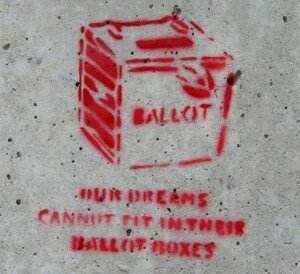To coincide with the publication of his latest book ‘Time to Save Democracy’, Crick Centre Associate Fellow Professor Henry Tam discusses some of the more sinister, hidden barriers to democratic politics in the West. In order to protect and re-energise democracy, he argues that reforms need to go beyond the franchise.
When we look back on reforms such as the Representation of the People Act of 1918, which extended the franchise to men without property and conceded for the first time voting rights to women (albeit only those with property), it is understandable why many would consider it a milestone in the development of democracy. But recent experience has taught us that the vote is simply not enough.
Even with universal franchise, an electoral process can all too easily be subverted to further the interests of a powerful few. US Senator B. Penrose (Republican) explained to his wealthy business supporters back in 1896 how it would work: “I believe in the division of labor. You send us to Congress; we pass laws under which you make money … and out of your profits, you further contribute to our campaign funds to send us back again to pass more laws to enable you to make more money”. Over a century later, flagrant plutocracy has only got worse.
On both sides of the Atlantic, big corporations which stand to lose most from public policies that could place stricter limits on their harmful activities are among the most generous political donors and relentless lobbyists. Gambling has proliferated online and on the high street; the casino ethos in banking is protected despite the financial chaos it caused; fracking and fossil fuels continue to be backed; employment conditions for ordinary workers become ever more precarious; benefits for the vulnerable are relentlessly cut; and loopholes for tax evasion and money laundering remain intact.
The tactics vary from undermining civic unity through faith-based divisions, and setting up new barriers to using one’s vote, to rolling back limits on campaign-related expenditure, while allowing lies and distortion to continue without challenge.
For example, although lack of understanding of others’ religious or secular beliefs has been increasingly exploited to fuel distrust of ‘others’ since 2001, faith-based education has continued to be promoted. By 2017, 37% of state-funded primary schools were faith-based, and the government intends to allow them to select all their pupils on the basis of their religion, even though public funding comes from people of all faiths and none. Instead of enabling young people from diverse backgrounds to become more familiar with each other at an early age, segregation is being extended.
In the meantime, the UK government is exploring tactics deployed by US Republicans to invoke the alleged need for voter ID to bring in obstacles which would make it more difficult for those less likely to back plutocrats to use their vote. Research in the US has found that Republican Voter ID laws might have prevented up to 31 cases of voter fraud out of a billion votes cast between 2000 and 2014. The Brennan Center at New York University estimated that 11% of eligible voters in the US lack the kind of photo ID that are generally required by these laws, and ‘they are disproportionately black, Latino, low income, students and elderly voters.’
As for campaign spending, contrary to advice from the Electoral Commission to all parties to abide by the agreed limits, the Conservative government changed the law and increased the limit by 23% in 2015, so it could outspend other parties in the coming elections. In fact, their spending still ended up exceeding the raised limits, though they are unlikely to be deterred from doing it again since they were fined a paltry £70,000 by the Electoral Commission for their transgression.
And although the Leveson Inquiry had unequivocally found that, in relation to the behaviour of the British press, “when assessed as a whole, the evidence of discriminatory, sensational or unbalanced reporting in relation to ethnic minorities, immigrants and/or asylum seekers, is concerning”, the government had stopped the Inquiry from moving onto the second phase when it would have investigated how systemic misrepresentation by the press could be dealt with. Needless to say, the disconcerting misrepresentation was generally of the type that helps plutocratic politicians divert public anger towards vulnerable scapegoats.
Reforms of electoral procedures are important, but even more important is having a pro-democracy policy framework that can stop plutocrats and their unscrupulous corporate donors and media backers from loading the electoral dice in their favour every time.
—
Henry Tam is a writer, activist, and academic. He is the Director of the Forum for Youth Participation & Democracy, University of Cambridge; and Visiting Professor at Birkbeck College, University of London.
Henry Tam’s latest book, Time to Save Democracy: how to govern ourselves in the age of anti-politics, sets out 40 recommendations for reviving democratic governance, and is available from Policy Press: https://policypress.co.uk/time-to-save-democracy
—
This article gives the views of the author, and not the position of the Crick Centre or the Understanding Politics blog series.
To write for the Understanding Politics blog series please contact [email protected]





